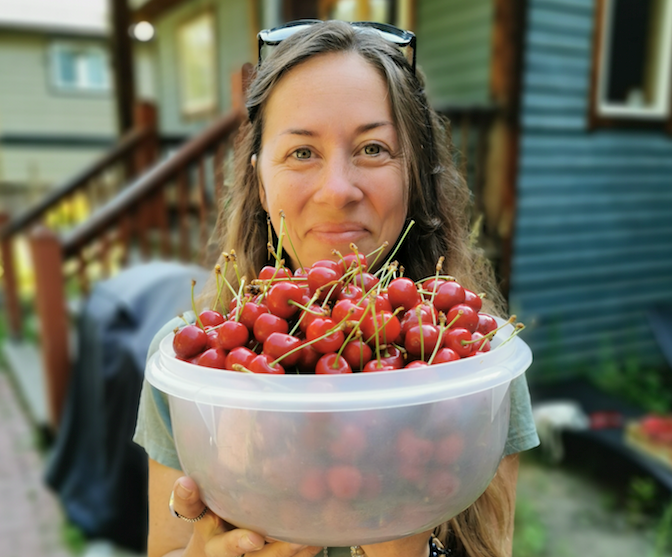The Pemberton Fruit Tree project has returned to spread even more sweetness throughout the valley this summer.
Launched in 2016, the project was created in an effort to reduce human-bear conflict in and around Pemberton while simultaneously connecting people with excess fruit with those who need it. The gist: Landowners who are unable to pick the fruit on their property can register their trees with the project’s coordinator. When the fruit is ripe, volunteers swoop in to clear the branches. That fruit is then divided into thirds and shared equally between the property owner, volunteers and local organizations—for example, the Food Bank, Pemberton Seniors Society, Pemberton Healthy Pregnancy Outreach Program and Signal Hill Elementary School’s Breakfast and Lunch Club Program, to name just a few.
“And most of the time, everyone gets absolutely plenty,” explained Belinda Geisler, Stewardship Pemberton Society’s (SPS) Feasting for Change coordinator.
The Fruit Tree Project is operated by the SPS under its Feasting for Change umbrella, which also covers the Pemberton Seed Library, the Grow-It-Forward Garden and the Pemberton Crabapple project. It’s funded by the Whistler Community Foundation and the Pemberton Wildlife Association, as well as initiatives like an orange-selling fundraiser and sales of Feasting for Change’s crabapple jelly, made from fruit collected from Pemberton crabapple trees.
In just five years, its impacts have been substantial: According to the SPS, the local Conservation Officer Service reported 66 per cent fewer bear calls in the area in 2020 than it did in 2019. Since its inception, the project has removed more than 4,580 kilograms of fruit from local trees and provided more than 2,720 kg to community organizations that needed it. Last year alone, volunteers harvested almost 1,500 kg of fruit from a total of 34 trees on 15 different properties, Geisler said, as well as a local blueberry farm.
So what’s the trick to beating the bears to a perfectly ripe cherry tree?
“It’s a bit of luck,” said Geisler with a laugh. “We try and get there the day before it's overripe, because as it ripens [the fruit] starts giving out this delicious smell. So if we can get there the day it ripens as opposed to three days after it's ripened, we have more luck. If the berries are doing well, if the fish are running, then we have more luck.”
Geisler and her team of volunteers have visited nine cherry trees so far this year—six new trees and three returning from previous years—from which they picked nearly 220 kg of cherries. That’s a significantly bigger haul than the 161 kg of cherries they harvested in 2020.
“So if this is a trend for the whole summer it will be busier that last year, which was busier than the year before,” she said.
Now with harvests slowed down before the apple, pear, plum trees and grape vines ripen later this summer, the project’s coordinator is always looking for more volunteers and fruit tree owners—as well as local organizations to distribute the fruit forward—to keep its wheels spinning.
Currently, the project counts 100 volunteers (or “volunteer hopefuls,” as Geisler likes to call the ones she knows only by their email address) on its email list. The number of volunteers needed for every harvest varies greatly by the type, size and number of trees, she explained. For example, “I had one tree with 10 pounds of cherries, and one tree with 120 pounds,” said Geisler.
But beyond the measurable impacts, the real benefit of the Fruit Tree Project is found in the bonds it creates throughout the community, she added.
“It's magic to be in a tree with a group of people when you're relying on them, to make sure the ladders are safe and to help each other down and out of the tree, and you're sharing recipes, [and] just the different fruit that you're going to go home and eat,” Geisler said.
“It's very different to when you would do a ‘you-pick,’ where you go out with your family and you pick your fruit and you pay for it and go away. Here, you all come together, you pick it together, you weigh it together and everyone's working towards this common goal of feeding the whole town. That sense of community and of sharing, and of the abundance—it's really special.”
To register a fruit tree or to be added to the volunteer email list, send a message to Geisler at [email protected].




